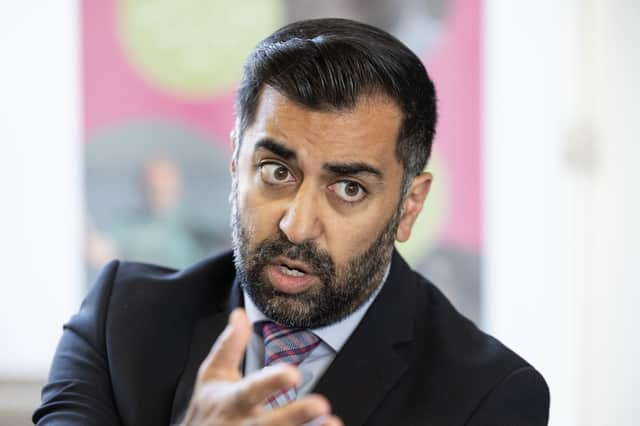The wheels are coming off Humza Yousaf’s wagon – Brian Monteith


Last week Humza Yousaf announced the latest in a veritable catalogue of mis-sold policies describing how “Scottish independence” will be achieved. Previously, back in the mists of time before Jim Callaghan became prime minister, the SNP position (and one that genuinely scared a 70s establishment that still believed in parliamentary sovereignty) was if the SNP won a simple majority of Scottish MPs there would need to be talks about how independence could peacefully be realised.
That all changed with the devolution referendum in 1979, for although the vote was won, it did not secure enough support required for constitutional change to happen. Yet what it did achieve was an acceptance that using a referendum to win the endorsement of the people, including losers’ consent, was preferable to relying on parliamentary majorities.
Advertisement
Hide AdAdvertisement
Hide AdYes, there had been a Common Market referendum in 1975, but it had sought a confirmatory endorsement of decisions already taken, first in 1972 and then in 1975 by the Conservative and Labour governments respectively. It was not explicitly the route to achieve such momentous change. By 1997, when Tony Blair was elected by a landslide there was no doubting the route to devolution – until then opposed by the SNP – must be through a referendum.
Now, be it for changing the voting system of electing our representatives, remaining in or leaving the European Union – or deciding if Scotland should secede from the United Kingdom – using a referendum has become the necessary prerequisite to deciding about constitutional change.
There is debate to be had about process; who should have the franchise, framing the questions and what majorities should be required – but pretending a majority of Scottish MPs would be enough for breaking up the whole of the UK holds no moral authority.
Since 2014 we have had the SNP leadership advocating the need for sustaining over a year a 60 per cent minimum of the Scottish electorate supporting independence before holding a referendum; then it became winning a 50 per cent +1 vote share (irrespective of the level of turnout); then winning a majority of those elected (irrespective of the share of the vote or the level of turnout); and now it is being the largest party in the next general election no matter the majority of MPs may actually be against secession (never mind the majority of vote share). It would be beyond satire, if BBC Scotland still allowed it.
So why has the SNP leader announced a policy that is so at odds with commonly accepted democratic standards required to obtain both domestic and international acceptance?
The answer is in plain sight. After losing in 2014 the SNP leadership abandoned trying to convince the broader Scottish people and instead spoke only to its base – to, first, maintain the leadership’s power; and secondly, the party’s domination of Scotland. The approach relied upon stoking division and polarisation – thereby abandoning any chance of extending support for independence.
In time, through the introduction of even more divisive policies, such as gender politics, independence was further relegated behind savouring the fruits of power with the Greens.
The hubris that comes from wallowing in an expenses paid, courtier supported, generously pensioned legislature with the idealism of a student union but the naivety of a Wendy House has corrupted Scottish politics – creating tangible differences between the beliefs of the people and the unchecked elite.
Advertisement
Hide AdAdvertisement
Hide AdThe old maxim says it is not the destination but the journey that brings most reward, which could explain why the current SNP leadership chooses policy options that ensure the journey never stops. Instead, it takes self-indulgent detours up branch lines to nowhere when demonstrations of competency and Scottish thrift could convert doubters .
What this journey from potential supermajority democratic credibility to a sub-optimal minority “mandate” reveals is the SNP has been rumbled, that it is not interested in finding the Holy Grail at all, for it is too much like hard work.
That's not to say there aren't some nationalists who roll up their sleeves and commit themselves to the toil and sweat from difficult challenges and the possibly long periods of unpopularity that building their case would require – but none of them are those running the SNP.
A genuine case for independence would require honesty with the Scottish public and that will not be forthcoming from Yousaf or his political dependants; it would require an admission that just as Ireland’s first fifty years meant enduring relative poverty an “independent” Scotland could not afford current levels of welfare, current subsidies to energy generation and infrastructure, would require a truly separate independent currency that would be hugely costly for most Scottish home owners, and yet would also require tax cuts to attract wealth creators. Meanwhile Scotland could not easily or quickly become an EU member.
Instead of building a case the wheels have truly come off the SNP wagon leaving Yousaf and his dwindling disciples to push their sledge uphill.
The SNP commitment to ever-lower criteria for “opening negotiations on independence” are nothing short of a Ponzi scheme to continue attracting membership fees that might keep them in the party political splendour they became accustomed to. But we all know what happens to Ponzi schemes.
No matter how much lower Yousaf keeps setting the bar he appears unable to reach it. In truth, his party requires the creative destruction of losing badly for it to stand any chance of accepting its errors and re-inventing itself in a more attractive form.
Brian Monteith is a former member of the Scottish and European Parliaments and editor of ThinkScotland.org